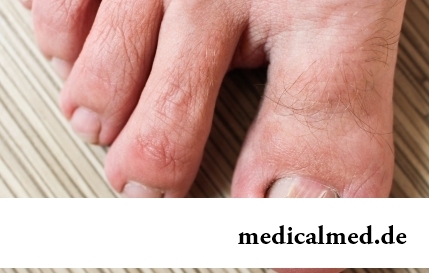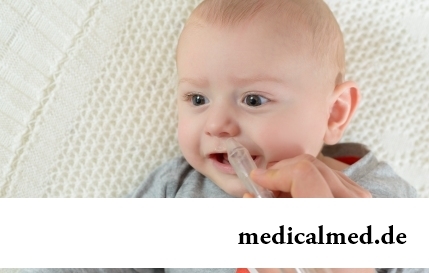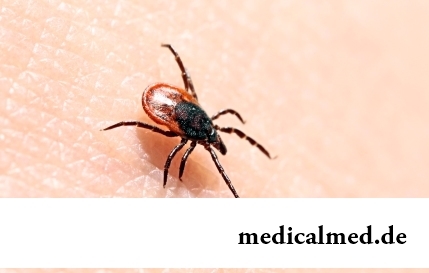





Apraxia
Apraxia (apraxia; and - – otritsa. Greek praxis – action) – disturbances of purposeful action against the background of safety of the elementary movements making it is frequent +; it is observed at focal defeats of bark of big cerebral hemispheres or conduction paths of a corpus collosum.
Types of apraxia:
- Akinetic (akinetica; synonym: apraxia psychomotor) – is caused by a lack of motivation to the movements;
- Anamnestic (amnestica) – disturbances of any actions against the background of preservation imitative;
- Bilateral (bilateralis) – bilateral apraxia; arises in the presence of the pathological centers in the lower parietal segment of a dominant hemicerebrum;
- Ideatorny (ideatoria; Greek idea – an image, the idea; synonyms: To Markuza apraxia, Bongeffera associative apraxia, Peak ideatorny apraxia) – impossibility to draw up the plan of consecutive actions which are necessary for implementation of difficult motive acts;
- Ideokineticheskaya (ideokinetica; Greek idea – an image, the idea + kinetikos – belonging to the movement) – is caused by loss of ability to purposeful performance of simple actions which draw up the difficult motive statement, at preservation of a possibility of their accidental performance;
- Kinaesthetic (kinaesthetica; synonym: apraxia afferent) – is caused by disturbance of autokinesias because of frustration of a kinaesthetic afferentation; it is characterized by search of the necessary movements; arises at defeats of bark of postcentral area of a dominant hemicerebrum;
- Constructive (constructiva) – impossibility to make the whole subject of its parts;
- Cortical (corticalis) – arises at defeats of bark of a dominant hemicerebrum;
- Frontal (frontalis) – disturbances of programming of the difficult, proceeding consistently motive acts; arises at defeats of bark of prefrontal area of hemicerebrums;
- Motor (motoria) – impossibility of implementation of the difficult motive act at preservation of ability to draw up the plan of the sequence of the actions necessary for its performance;
- Clothing – clothing difficulty; it is observed at defeats of pariyetooktsipitalny area of bark of a great brain;
- Oral (oralis) – motor apraxia of facial muscles with disorders of the difficult movements of language and lips; leads to disturbances of the speech;
- Premotorny (praemotoria; synonym: apraxia dynamic) – is caused by a dezavtomatization of motive acts and their pathological inertness; it is characterized by disturbances of skills which are necessary for transformation of separate movements in more difficult; it is observed at defeats of premotorny area of bark of a great brain;
- Space – disturbance of orientation in space, mainly, in the right-left direction;
- Walking – disturbance of walking in the absence of vestibular, proprioceptive, motive frustration and an ataxy; it is observed at defeats of bark of frontal lobes of a great brain.
In the aspiration to pull out the patient, doctors often go too far. So, for example, a certain Charles Janszen during the period from 1954 to 1994 endured more than 900 operations on removal of new growths.

The word "onikhokriptoz" is unfamiliar to most of people, meanwhile quite so physicians call very widespread problem: growing...
Section: Articles about health
Household skills which to us so diligently imparted in the childhood it appears, not always bring only benefit. According to results of the last researches, some habits which for a long time were considered useful and even necessary can become...
Section: Articles about health
Diseases of joints often begin imperceptibly for the person. The first stages of destruction of the cartilaginous tissue providing soft and free sliding of heads of bones in joint bags proceed slowly and absolutely without serious consequences. Especially unpleasantly for the fact that this process is not connected with advanced age: degradation of joint surfaces is, as a rule, noticeable after 30 years. It means that practically each able-bodied person at any time can face sad results...
Section: Articles about health
Feeding by a breast - the integral part of ideal motherhood allowing to come into contact with the kid and to create since early years...
Section: Articles about health
The business lady, the become mother, it is necessary to solve an array of problems. But of them is main: how to combine the beloved child and work? What traps trap the working mother and how she needs to behave?...
Section: Slideshow
Maternal milk is the best food for the newborn. It is the unique natural product containing an optimum set of nutrients, and which is best adapted in order that the baby normally developed and it was protected from harmful factors of external environment, unusual for it. Unfortunately, breastfeeding process not always does without complications. Sometimes, that the kid begins to bite a breast, giving to mother an essential inconvenience. Some women...
Section: Articles about health
According to doctors, more than a half of men of 25-50 years suffer from frustration of the urinogenital sphere, but sees a doctor from them меньшинс...
Section: Articles about health
For the last decades the diabetes mellitus of the second type became really world problem. The number of cases annually increases, and average age of patients for whom the illness is diagnosed, steadily decreases. Specialists consider that one of osno...
Section: Articles about health
Each failure in work of bodies and systems of a human body is, as a rule, shown by the whole complex of symptoms. In particular, malfunctions with health often cause emergence of cosmetic defects in the form of rashes on a face. Experienced doctors know that localization of heat-spots usually depends on what disease the patient has....
Section: Articles about health
The next flu epidemic leads to the next panic, from year to year we give in on these manipulations: professionally alarming goal...
Section: Articles about health
Nightmares belong to the most unpleasant frustration. Statistically, they happen at 4% of adults, and almost at 70% of children and teenagers. During a nightmare of people dreams himself in extremely difficult, life-threatening situation. It wakens suddenly, in...
Section: Articles about health
Tick-borne encephalitis – one of the most dangerous viral diseases which causative agents transfer and is given to people by ixodic mites. These are the small blood-sicking insects living in the considerable territory of our country. The person bitten by a tick can catch also erlikhiozy, bartonnelezy, babeziozy, mycoplasmosis and Lyme's disease. As well as encephalitis, these illnesses affect the central nervous system, and as specific antiviral therapy does not exist, the forecast very to a neuta...
Section: Articles about health
Tea is loved and use almost everything. This drink has tonic properties, contains the tannins capable podavlit...
Section: Articles about health
Within several decades of our compatriots convinced that the use of butter nasty affects a condition of coronary vessels. As a result the reputation of a product was impaired thoroughly a little, and many almost ceased to include...
Section: Articles about health
Cystitis, or inflammation of a mucous membrane of a bladder, this very widespread disease which, owing to some features of a structure of bodies of urinogenital system, women have approximately four times more often than men. Women aged from 20 up to 45 years enter into the main risk group. Cystitis is an illness of a bacterial origin. It can have an acute or chronic current. The second option is dangerous not only a frequent recurrence, серьезн...
Section: Articles about health
Climax - process of fading of reproductive function of an organism in process of its aging. At women the main sign of its approach showing...
Section: Articles about health
The phenomenon of improvement of a condition of the patients at administration of drugs who are not containing active agents, so-called effect of placebo is known long ago. At the end of the 18th century the American doctor Perkins began to treat people the "miracle" sticks made of a spl...
Section: Articles about health
Urogenital candidiasis (milkwoman) – a fungal infection which annoys unpleasant feelings in the field of generative organs, being followed by white curdled allocations, an itch, discomfort during an urination, pain. She is called by Candida fungus – the opportunistic organism living on mucous membranes of an organism....
Section: Articles about health
Color of plants is caused by presence at them of certain chemical compounds. Let's talk that various colors mean vegetable...
Section: Articles about health
Women quite often suffer from complexes concerning the sizes of the bust. Strangely enough, not too modest, and excessively curvy shapes become the reason of sincere discomfort sometimes. Except psychological problems, a big bust sometimes with...
Section: Articles about health
Among a set of the perfumery and cosmetic goods which are released today the special group is made by the means containing antibacterial components. Such types of gels, shampoos, soaps, creams, lotions and other products are positioned by manufacturers as a panacea from all diseases caused by pathogenic microorganisms. The unlimited and uncontrolled use of similar means becomes result of trustfulness of the buyers hypnotized by persuasive advertizing sometimes. Many spetsial...
Section: Articles about health
Modern footwear is extremely various. It stopped being only protection for legs long ago. Today shoes, boots, barefoot persons in...
Section: Articles about health
Transfusion of donor blood has almost century history. In spite of the fact that this procedure is quite usual for many people, process of blood donation is still surrounded with numerous myths. Today we aimed to discredit the most widespread of them....
Section: Articles about health
The concept "gluten" (differently, a gluten) combines group of the proteins which are a part of rye, barley and wheat. For most of people the use of the food stuffs containing a gluten not only is safe, but also it is very useful. Nevertheless, there is a number of myths about negative effect which allegedly gluten has on health of the person....
Section: Articles about health
An eye of the person daily experiences considerable strain. The problem of preservation of sight is for many years directly connected with a question снабж...
Section: Articles about health
Heart disease and blood vessels lead to disturbance of blood supply of bodies and fabrics that involves failures in their work, deterioration in health of the person, decrease in its working capacity and standard of living. Annually such perishes from pathologies more...
Section: Articles about health
The main role in development of a peptic ulcer of a stomach and duodenum the bacterium Helikobakter plays pilor. Activity and the strengthened reproduction of this microorganism lead to weakening of protection of mucous membranes and their erosive damage. Displays of an illness seriously reduce quality of life: patients regularly test attacks of severe pain, heartburn, nausea. On this background also psychoemotional malfunctions develop: a kidney-vetch, as a rule, shows an acrimony, ча...
Section: Articles about health
